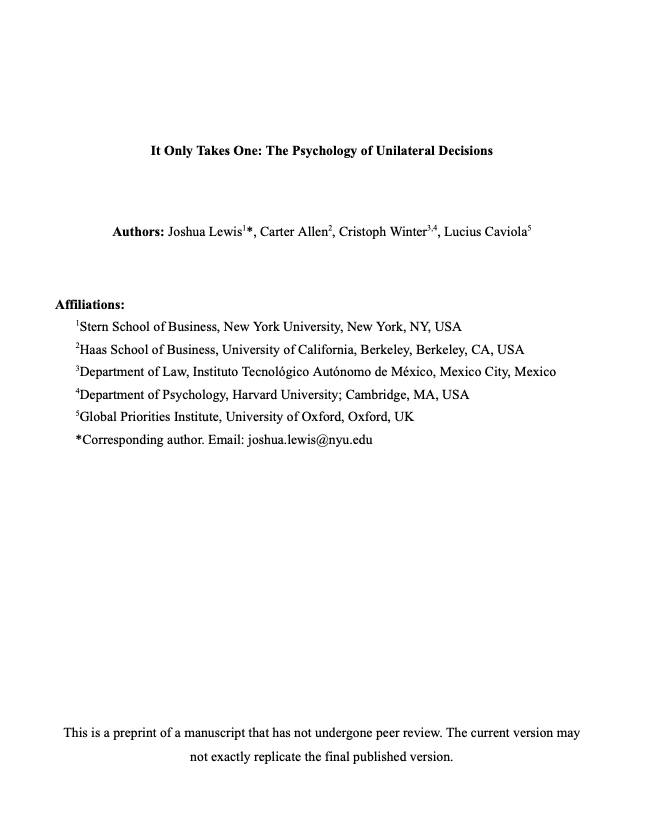It Only Takes One: The Psychology of Unilateral Decisions
Joshua Lewis (New York University), Carter Allen (UC Berkeley), Christoph Winter (ITAM, Harvard University and Institute for Law & AI) and Lucius Caviola (Global Priorities Institute, Oxford University)
GPI Working Paper No. 14-2024
Sometimes, one decision can guarantee that a risky event will happen. For instance, it only took one team of researchers to synthesize and publish the horsepox genome, thus imposing its publication even though other researchers might have refrained for biosecurity reasons. We examine cases where everybody who can impose a given event has the same goal but different information about whether the event furthers that goal. Across 8 experiments (including scenario studies with elected policymakers, doctors, artificial-intelligence researchers, and lawyers and judges and economic games with laypeople, N = 1,518, and 3 supplemental studies, N = 847) people behave suboptimally, balancing two factors. First, people often impose events with expected utility only slightly better than the alternative based on the information available to them, even when others might know more. This approach is insufficiently cautious, leading people to impose too frequently, a situation termed the unilateralist’s curse. Second, counteracting the first factor, people avoid sole responsibility for unexpectedly bad outcomes, sometimes declining to impose seemingly desirable events. The former heuristic typically dominates and people unilaterally impose too often, succumbing to the unilateralist’s curse. But when only few people can impose, who know the stakes are high, responsibility aversion reduces over-imposing.
Other working papers
The epistemic challenge to longtermism – Christian Tarsney (Global Priorities Institute, Oxford University)
Longtermists claim that what we ought to do is mainly determined by how our actions might affect the very long-run future. A natural objection to longtermism is that these effects may be nearly impossible to predict— perhaps so close to impossible that, despite the astronomical importance of the far future, the expected value of our present actions is mainly determined by near-term considerations. This paper aims to precisify and evaluate one version of this epistemic objection to longtermism…
Existential risk and growth – Leopold Aschenbrenner (Columbia University)
Human activity can create or mitigate risks of catastrophes, such as nuclear war, climate change, pandemics, or artificial intelligence run amok. These could even imperil the survival of human civilization. What is the relationship between economic growth and such existential risks? In a model of directed technical change, with moderate parameters, existential risk follows a Kuznets-style inverted U-shape. …
Numbers Tell, Words Sell – Michael Thaler (University College London), Mattie Toma (University of Warwick) and Victor Yaneng Wang (Massachusetts Institute of Technology)
When communicating numeric estimates with policymakers, journalists, or the general public, experts must choose between using numbers or natural language. We run two experiments to study whether experts strategically use language to communicate numeric estimates in order to persuade receivers. In Study 1, senders communicate probabilities of abstract events to receivers on Prolific, and in Study 2 academic researchers communicate the effect sizes in research papers to government policymakers. When…

